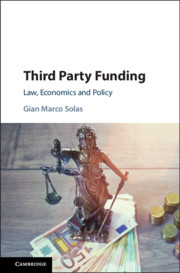Book contents
- Third Party Funding
- Third Party Funding
- Copyright page
- Dedication
- Contents
- Acknowledgements
- Abbreviations
- 1 Introduction
- Part I A Comparative Overview
- Part II An Economic Analysis
- 4 The Emergence of the Litigation Market and TPF
- 5 An Economic Analysis of TPF
- 6 Social Impact of TPF
- Part III Contractual, Regulatory and Policy Considerations
- Bibliography
- Index
5 - An Economic Analysis of TPF
from Part II - An Economic Analysis
Published online by Cambridge University Press: 16 September 2019
- Third Party Funding
- Third Party Funding
- Copyright page
- Dedication
- Contents
- Acknowledgements
- Abbreviations
- 1 Introduction
- Part I A Comparative Overview
- Part II An Economic Analysis
- 4 The Emergence of the Litigation Market and TPF
- 5 An Economic Analysis of TPF
- 6 Social Impact of TPF
- Part III Contractual, Regulatory and Policy Considerations
- Bibliography
- Index
Summary
This chapter analyses the incentives of TPF transactions in different legal contexts and, in addition, the economics of TPF transactions. It first does so by discussing the reasons why parties enter into TPF deals, relying on some mainstream litigation economics concepts (Shavell litigation formula and De Morpurgo basic TPF model) and developing them further, also with concrete cases. More in particular, it shows why and under what circumstances third party funders would be better placed to deal with litigation than the parties with their own funds or than the other actors in the litigation market. It then fragments and discusses the specific litigation cost and risk items that form barriers to access justice and solve disputes, trying to see how third party funders would be capable of intervening to help overcome them while dealing with TPF transactions. It ultimately discusses how third party funders create value, also in a portfolio perspective.
- Type
- Chapter
- Information
- Third Party FundingLaw, Economics and Policy, pp. 167 - 226Publisher: Cambridge University PressPrint publication year: 2019

